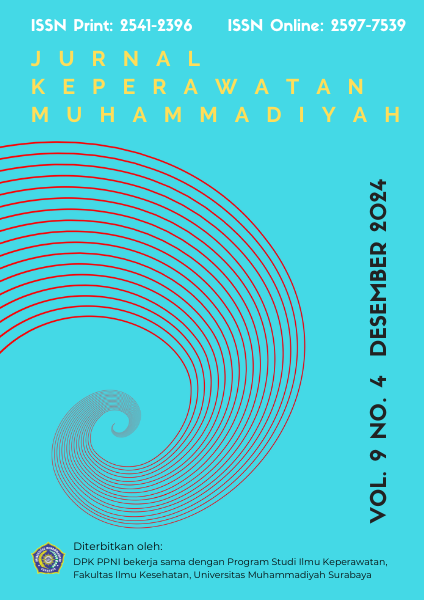RELATIONSHIP BETWEEN SLEEP QUALITY AND STRESS WITH BLOOD PRESSURE OF THE ELDERLY IN PUTON VILLAGE, DIWEK DISTRICT, JOMBANG REGENCY
DOI:
https://doi.org/10.30651/jkm.v9i4.25101Keywords:
Sleep quality, Stress, Blood pressureAbstract
Objective: Hypertension is a disease that causes death silently or is called a silent killer. Many people with hypertension are not aware of the symptoms and problems that occur because there are no warning signs or symptoms (WHO, 2021). Risk factors that can affect the incidence of hypertension include sleep quality and stress. The purpose of this study was to determine the relationship between sleep quality and stress with blood pressure.
Methods: This article design used correlational research with a "Cross Sectional" approach. The population of this study was the elderly in Puton Village, Diwek District, Jombang Regency, totaling 35 people. Sleep quality and stress were measured using a questionnaire. Blood pressure was measured using a sphygmomanometer according to standard guidelines. Data analysis by editing, coding, scoring, tabulation and statistical tests were carried out using the Spearman Rank test.
Results: Most respondents have poor sleep quality. Most respondents are normal, not experiencing stress. Most respondents have systolic blood pressure with grade 1 hypertension. almost half of respondents have diastolic blood pressure with grade 1 hypertension and grade 2 hypertension. The results of the analysis between sleep quality and systolic and diastolic blood pressure obtained a p value> 0.05 which indicated that there was no relationship between sleep quality and blood pressure, both systolic and diastolic. This is the same as the relationship between stress with systolic and diastolic blood pressure, where the test results obtained a p value> 0.05 which indicates that there was no relationship between stress and blood pressure, either systolic or diastolic
Conclusion: In addition to sleep quality and stress, there are other factors that affect blood pressure that cannot be controlled by researchers that have an impact on changes in blood pressure. Controlling the role factors is very necessary to obtain significant results.
References
Anwar, T. (2004). Dislipidemia sebagai faktor resiko penyakit jantung koroner. Fakultas Kedokteran Universitas Sumatra, 1–10.
Callista RE. (2017). Hubungan Indeks Massa Tubuh Dan Kadar Stres Total Dengan Tekanan Darah Pada Pekerja Perusahaan Kayu Di Mojokerto.
Dinas Kesehatan Kabupaten Jombang. (2019). Profil Kesehatan Kabupaten Jombang 2019.
Dinas Kesehatan Provinsi Jawa Timur. (2020). Profil Kesehatan Provinsi Jawa Timur 2020. Dinas Kesehatan Provinsi Jawa Timur.,. www.dinkesjatimprov.go.id
Kementerian Kesehatan RI. (2019). Infodatin Hipertensi Si Pembunuh Senyap.
Maryati H, dkk (2024). Hubungan Perilaku Cerdik Dengan Tekanan Darah Penderita Hipertensi Di Desa Puton Kecamatan Diwek Kabupaten Jombang. 10(2). 421-425. DOI: https://doi.org/10.33023/jikep.v10i2.2195
Nofia, V. R., Yanti, E., & Andra, H. (2019). Hubungan Kadar Stres Dengan Tekanan Darah Pada Pasien Hipertensi Di Puskesmas Rawang Kota Sungai Penuh. Jurnal Kesehatan Saintika Meditory, 2, 115–124. https://jurnal.syedzasaintika.ac.id/index.php/meditory/article/view/453
Rahmatillah, V. P., Susanto, T., & Nur, K. R. M. (2020). Hubungan Karakteristik, Indeks Massa Tubuh (IMT) dengan Tekanan Darah pada Lanjut Usia di Posbindu. Media Penelitian Dan Pengembangan Kesehatan, 30(3), 233–240. https://doi.org/10.22435/mpk.v30i3.2547
Siswati S, dkk. (2021). Senam Hipertensi Sebagai Upaya Menurunkan Tekanan Darah Pada Penderita Hipertensi. 6(2). 46–50. DOI: https://doi.org/10.24929/jik.v6i2.1504
Ulumuddin I. & Yhuwono Y. (2018). Hubungan Indeks Massa Tubuh Dengan Tekanan Darah Pada Lansia Di Desa Pesucen, Banyuwangi. 13(1), 1–6. https://jurnal.unimus.ac.id/index.php/jkmi/article/view/3437
WHO. (2021a). Guideline for the pharmacological treatment of hypertension in adults. https://www.who.int/publications/i/item/9789240033986
WHO. (2021b). Hypertension. WHO. https://www.who.int/health-topics/ hypertension #tab=tab_1
Downloads
Published
Issue
Section
License
Copyright (c) 2024 Supriliyah Praningsih, Siswati, Heni Maryati, Ratna Puji Priyanti

This work is licensed under a Creative Commons Attribution-ShareAlike 4.0 International License.
- Penulis tetap memegang hak atas karyanya dan memberikan hak publikasi pertama kepada jurnal ini yang secara simultan karya tersebut dilisensikan di bawah:Â Creative Commons Attribution-ShareAlike 4.0 International (CC BY-SA 4.0)













